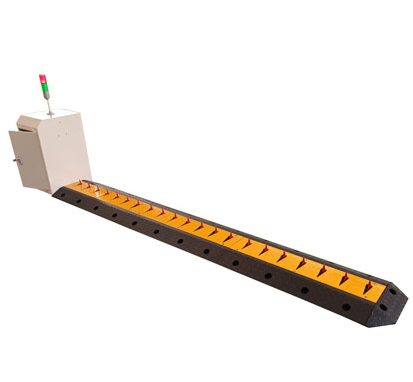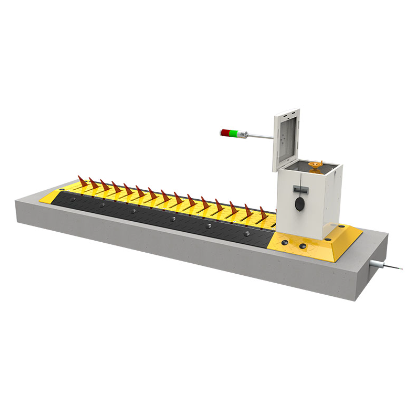Tyre killers, also known as road blockers or spike strips, are critical components in enhancing security at entry points, particularly in high-security areas such as military bases, government buildings, airports, and private facilities. These devices are designed to prevent unauthorized access and to stop vehicles that attempt to enter restricted zones. While they are not a new security solution, tyre killers have gained popularity due to their effectiveness in quickly halting vehicles, deterring criminal activity, and protecting valuable assets. In this article, we will explore the role of tyre killers, how they function, and why they are an essential element in modern security systems.
What Are Tyre Killers?
Tyre killers are security devices installed at entry points to prevent vehicles from passing through unauthorized areas. They function by puncturing or damaging the tyres of vehicles that attempt to forcefully pass through a gate or checkpoint. The main purpose of these systems is to stop vehicles in their tracks, disabling them from further movement and making them easier to apprehend by security personnel.
Tyre killers typically consist of a series of sharp metal spikes or blades that protrude from the ground when activated. When a vehicle attempts to drive over the spikes, they puncture or shred the tyres, rendering the vehicle immobile. This rapid and effective deterrent is ideal for use in high-risk areas where immediate action is required to stop unauthorized access.
How Do Tyre Killers Work?
Tyre killers work by exploiting the vulnerability of vehicle tyres. Most tyre killer systems are automated, meaning they can be raised or lowered depending on the security needs of the area. Here’s how they typically function:
- Spike Deployment: The tyre killer device is usually installed within the ground at entry points. When a vehicle attempts to pass through, sensors or security personnel activate the system, causing a series of metal spikes or blades to rise from the ground. These spikes are often made of hardened steel, ensuring that they can puncture or deflate tyres on impact.
- Vehicle Detection: Some tyre killer systems use sensors or cameras to detect approaching vehicles. These systems can be integrated with surveillance technologies, allowing for seamless operation. In cases of unauthorized vehicles or if a vehicle is approaching at high speed, the system is triggered to deploy the spikes in an instant.
- Instant Vehicle Immobilization: As the vehicle passes over the tyre killer, the sharp spikes puncture the tyres. Once the tyres are punctured, the vehicle is immobilized and can no longer move, preventing further penetration into the restricted area.
- Automatic Retraction: After a vehicle has been stopped, some tyre killers automatically retract their spikes into the ground, allowing for safe passage for authorized vehicles. This feature ensures that only unauthorized vehicles are affected.
Applications of Tyre Killers
Tyre killers are used in a variety of high-security environments where the risk of unauthorized vehicle access is a concern. Some of the most common applications include:
1. Military and Government Facilities
One of the most common applications for tyre killers is in military and government installations where security is a top priority. Tyre killers are often used at the gates or perimeters of military bases, embassies, and government buildings to prevent unauthorized access. They serve as an immediate deterrent against potential vehicle-based attacks or intrusions.
2. Airports and Critical Infrastructure
Airports, power plants, and other critical infrastructure facilities are prime targets for terrorists or criminals seeking to cause disruption. Tyre killers are deployed at security checkpoints, terminal entrances, and perimeters to stop vehicles that may attempt to bypass security measures or launch attacks. With their ability to instantly disable a vehicle, tyre killers act as a powerful first line of defense against potential threats.
Heavy Duty TKB-30E Flush Mount Type Tyre Killer
3. Private Security and Gated Communities
Private security firms and gated communities often utilize tyre killers at entry points to prevent unauthorized vehicles from gaining access to restricted areas. These systems are commonly used in conjunction with other access control measures such as gates, guards, and surveillance systems to provide an extra layer of security.
4. Events and High-Profile Gatherings
During high-profile events or gatherings, such as political summits, public speeches, or large conventions, tyre killers can be deployed to control access to the venue. The presence of tyre killers ensures that any attempts to breach security with vehicles are immediately thwarted, making it easier for security forces to monitor and respond to potential threats.
The Advantages of Tyre Killers
Tyre killers offer several significant advantages that make them a valuable asset in modern security systems:
1. Instant Response
One of the key benefits of tyre killers is their ability to stop vehicles in an instant. Unlike traditional methods of stopping vehicles, such as spike strips or physical barriers, tyre killers can immobilize a vehicle almost immediately upon activation. This rapid response is essential in situations where time is of the essence, such as during an attempted breach or attack.
2. High Effectiveness
Tyre killers are highly effective in preventing unauthorized access. They can puncture or deflate the tyres of almost any vehicle, rendering it immobile and preventing further movement. This ensures that the vehicle is stopped without relying on manual intervention or the need for complex security procedures.
3. Low Maintenance
Once installed, tyre killers require minimal maintenance. They have a simple mechanical design with few moving parts, which reduces the chances of malfunction. Regular checks to ensure the spikes are in good condition and that the system is functioning as intended are typically sufficient to maintain their reliability.
4. Deterrent to Criminal Activity
Tyre killers act as a powerful deterrent to criminals. The mere presence of tyre killers at entry points signals to potential intruders that access will not be easily gained. This can discourage criminals from attempting to breach security, knowing that they are likely to be stopped before they can cause any damage or harm.
Challenges and Considerations
While tyre killers provide an effective security solution, there are some challenges and considerations that need to be addressed when implementing them:
1. Vehicle Damage
Tyre killers are designed to disable vehicles by puncturing or shredding their tyres. While this is effective in stopping unauthorized access, it can also cause significant damage to vehicles. This can be problematic in situations where innocent vehicles, such as emergency response vehicles, may need to pass through the entry point.
2. Cost
The installation of tyre killers can be costly, especially for large facilities with multiple entry points. However, the investment may be justified in high-risk environments where security is a major concern. Additionally, the low maintenance costs and long lifespan of tyre killers can help offset the initial installation expense.
3. Accessibility for Authorized Vehicles
Tyre killers must be managed carefully to ensure that they do not obstruct authorized vehicles. In many cases, these devices are automated, retracting when a vehicle with the proper authorization approaches. However, a malfunction or incorrect activation could prevent legitimate vehicles from passing through, causing delays or disruptions.
Conclusion
Tyre killers are an essential tool for safeguarding entry points to high-security areas. Their ability to instantly disable unauthorized vehicles makes them highly effective in preventing breaches and protecting valuable assets. While they have some challenges, such as vehicle damage and cost, their advantages in terms of speed, effectiveness, and deterrence make them a crucial part of modern security systems. By integrating tyre killers with other security measures, organizations can enhance their ability to control access and prevent potential threats before they escalate.



